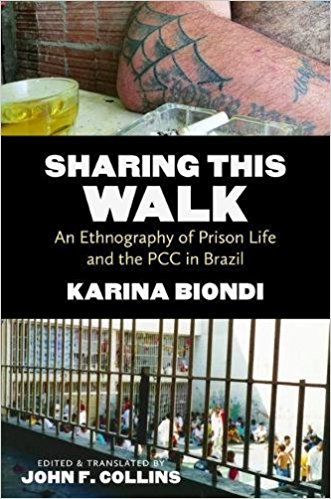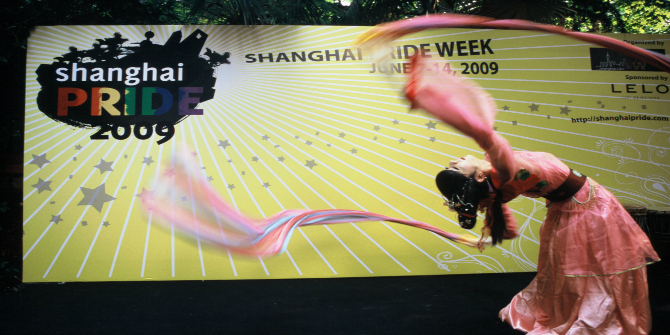In Sharing This Walk: An Ethnography of Prison Life and the PCC in Brazil, Karina Biondi offers an ethnographic study of São Paulo’s state prisons, focusing particularly on the prison gang Primeiro Comando da Capital (PCC). This elegant and rigorously argued book offers a compelling critique of existing depictions of prison life in Brazil and challenges entrenched understandings of ‘organised crime’, writes Eraldo S. Santos.
Sharing This Walk: An Ethnography of Prison Life and the PCC in Brazil. Karina Biondi (edited and translated by John F. Collins). University of North Carolina Press. 2016.
‘The main avenues of São Paulo are never deserted.’ In Roberto Marinho Avenue, Karina Biondi glances from her car window at ‘the city that never sleeps’ before it is touched by the Saturday morning light. ‘The reasons people are out and about at this hour are too numerous to count. But there is one cruel reason for leaving one’s home at this hour, and I have come to know it all too well.’
Along with many other relatives of prisoners, Biondi is starting just another long journey to visit her husband in one of São Paulo state’s carceral facilities. Sharing This Walk: An Ethnography of Prison Life and the PCC in Brazil is the result of years of research conducted by Biondi in the state’s prisons in which her husband was incarcerated. In her first book, which is the English translation of the published edition of her Masters thesis, ‘Juntos e Misturados: Uma Etnografia do PCC’, the author offers an ethnographic study of the PCC or Primeiro Comando da Capital (First Command of the Capital), a prison gang which in 2010 was already present in over 90 per cent of São Paulo’s carceral institutions. In a year that began with prison rebellions and riots in seven of Brazil’s federal states, Biondi’s book is showing itself to be more relevant than ever.
The wealth of analysed ethnographic data—as well as the effort and courage required to collect it—is only one of the merits of the research, which also proves to be a ground-breaking theoretical tour de force. ‘An ethnography of the PCC that attends to the real details of the group’s movements and development is thus also a wager on the possibility of novel anthropology,’ defends the author (122), whose project draws on contemporary efforts to produce a ‘postsocial social science’, as put forth by those such as Bruno Latour, Marilyn Strathern, Gilles Deleuze, Félix Guattari and Eduardo Viveiros de Castro. Indeed, Deleuze and Guattari’s philosophical jargon fills the book, in which concepts such as flows, intensities, velocities, rhythms, rhizomes, planes of immanence and transcendence play a fundamental role. In this regard, some of the study’s theoretical passages can be hard to follow for a reader who is not familiar with this tradition of thought.
The main line of argument is, nonetheless, clear. Elegantly and rigorously argued, the monograph offers a compelling critique of the way the press, the state and the institutionalised social sciences depict prison life in Brazil, and proposes a radical change in the categories commonly mobilised in political and scientific debates on ‘organised crime’.
 Image Credit: (Neil Conway CC BY 2.0)
Image Credit: (Neil Conway CC BY 2.0)
Since the 1990s, as Biondi shows in Chapter One, state representatives have denied the existence of the PCC. Nevertheless, the Command’s actions increasingly started to gain notice. In May 2006, a rebellion took shape in 84 penitentiaries. In São Paulo state’s capital, the impact was felt beyond prison walls: 82 buses were set on fire, 17 banks were bombed, 299 state institutions were attacked, 42 public safety agents and police officers were murdered and 38 were wounded (38-39). In the wake of the attacks, specialists in public safety and social scientists offered a diagnosis of the turmoil in which the PCC was presented as a hierarchical institution, marked by obedience, an absence of reciprocity and, above all, a lack of political, democratic societal aims, since it was said to be focused on business interests (39). Biondi’s principal purpose is to challenge this public depiction of the PCC as a hierarchical institution, structured as either a state-like, ‘parallel power’ or as a capitalist corporation.
To that end, Biondi insists that it is necessary to rethink the categories through which the PCC is commonly characterised. By departing from the definitions of ‘organised crime’ and ‘criminal organisation’ formulated in the United Nations Convention against Transnational Organized Crime, Biondi seeks to show that the PCC’s specific conception of politics cannot be conflated with ‘organised crime’, whose main characteristics are commonly said to be ‘hierarchy, expectation of profit, division of labor, entrepreneurial planning, and symbiosis with the state’ (97-98).
What sets the PCC apart from other prison groups, according to Biondi, is the value of equality. The addition of this concept to the group’s original motto—‘Peace, Justice, and Liberty’—represented, for the author, a watershed in the Command’s politics. From that moment on, the PCC abolished the notion of leadership and sought to become, in her words, ‘a Command without command’ (96). It did not mean that there would not be different membership statuses inside the ‘movement’, as she prefers to designate the PCC’s politics. Those differences, however, did not allow prisoners—neither those who are fully baptised members (Brothers, irmãos), those who are just part of the carceral population (Cousins, primos) nor even those Brothers who formulate the PCC’s policy communiqués (Towers, torres) —to claim authority or superiority over one another.
In order to highlight the specificity of this conception of political equality, Biondi draws on Pierre Clastres’s analysis of ‘societies against the state’. By departing from research conducted by him with Amerindian groups, Clastres argues that primitive societies are essentially egalitarian, resisting actively the development of state-like structures. Biondi sees a similar effort in motion in the PCC’s ‘micropolitics’. The different political positions are mainly due to the prisoners’ political abilities. Claims of equality prevent the crystallisation of hierarchies by triggering processes of ‘deindividualization’ that impede identification between individuals and the political position they occupy. Equality means, in this sense, the continuous collective struggle to ensure a form of life free of mutual domination (57). Both the original and the English title of the book reflect this conceptual constellation. Those who participate in ‘the Crime’ share a common ‘walk’ (caminhada), running alongside each other, side-by-side, all mixed together (todos juntos e misturados).
Here, a more detailed characterisation of the ‘modern, liberal nation-state’ (160) would have been appreciated in order to highlight the differences and possible similarities between the politics developed for and in the ‘PCC-as-movement’ and those political systems founded upon democratic representation and bureaucratic organisational structures. Such analysis could have elaborated upon the following insight formulated in the last paragraph of the book’s conclusion: ‘we have not escaped a situation in which the state serves as a tonic against the state’ (143).
Some important questions concerning the value of equality seem, moreover, to be left open. The native category of ‘thing’ (coisa) is a prime example, used to refer to prisoners who cannot enter the general prison population, being typically moved into protective custody. The complicated status of gay men discussed in Chapter Two is exemplary in this regard. Prisoners’ resistance against the PCC’s policy concerning the integration of gay men in the prison’s population (89) shows well, as Biondi points out, that the Towers’ communiqués are neither ‘orders’ nor law (157). The case also reveals, nevertheless, processes of exclusion which crisscross the formation of a community of equals. By insisting on claims of equality, Biondi tends to disregard such interconnection between dynamics of inclusion and exclusion.
The fundamental contributions of Biondi’s book to ongoing debates on the crisis of the carceral state in Brazil are, nonetheless, undeniable. By taking prisoners’ agency seriously, by problematising circulating categories such as ‘organised crime’ and by recognising prisons as places of knowledge production where new forms of democratic politics are invented and experimented with every day, Sharing This Walk invites the reader to see prison life in a different, more critical light.
Eraldo S. Santos is a PhD candidate at University of Paris I – Panthéon-Sorbonne. His doctoral research focuses on the history of the concept of ‘civil disobedience’. He analyses how it was reformulated in the context of the revival of political obligation theories in the US during the 1960s and 1970s. The project is funded by the Coordination for the Improvement of Higher Education Personnel (CAPES, Brazil). Read more by Eraldo S. Santos.
Note: This review gives the views of the author, and not the position of the LSE Review of Books blog, or of the London School of Economics.


 Find this book:
Find this book: 





1 Comments